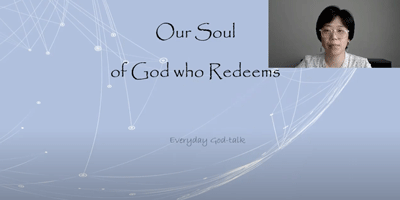Addressing environmental justice and climate crisis, Everyday God-talk explores how humanity ‘deflects the image of God’
by Paul Seebeck | Presbyterian News Service

The second episode of Everyday God-talk is ready to be viewed and discussed. So Jung Kim, associate for Theology in the Office of Theology & Worship, is pictured here.
LOUISVILLE — In episode two of the first official season of Everyday God-talk, host So Jung Kim uses the lens of Reformed theology to face what she calls “an inconvenient truth.”
The associate for Theology in the Presbyterian Church (U.S.A.)’s Office of Theology and Worship is focusing the first season of the reimagined Everyday God-talk on environmental justice and the climate crisis.
“Original sin, or the total depravity of the human, deformed the goodness of Creation, deflecting the image of God,” she said.
Season one uses the four major titles of John Calvin’s The Institutes of the Christian Religion, first published in 1559. Episode two is centered on “God who Redeems.”

So Jung Kim
Kim takes viewers through a theological perspective in Our Soul of God who Redeems, (room 1) asking apocalyptic questions including
- Is this the end of the world?
- As we ruin the Creation gifted by God, can we ever be forgiven?
- Do we have the image of God in us, despite our sinfulness?
As Kim wonders if Calvin had any insights into these questions about the image of God and salvation, she refers to “A Brief Introduction to John Calvin,” by Dr. Christopher Elwood. Here the professor of Historical Theology at Louisville Presbyterian Theological Seminar stresses that Calvin criticized the religious ideas and practices of his day. This effort at exposing error and distinguishing the living God from false and idolatrous depictions became a hallmark of Calvinism — and a number of other related movements in the modern world.
“For Elwood, we possess the image of God in which human beings were first created,” Kim said. “But it is not what it used to be. Now it’s a horrible deformity. We can see glimpses of what God intended for us when we look at who we are, but only very fleeting ones.”
Despite this, Kim said we have hope in the work the Holy Spirit, who unites us with Christ and helps us share the benefits — or, as Calvin puts it, “the Spirit conforms us to the image of Christ.”
In this process, Kim said, we are restored in God’s image. As we deny ourselves and take up our cross and follow Jesus (Matthew 16:24) and imitate the image of Christ, instead of false idols, our relationship to God and God’s Creation can be restored.
Kim said Elwood believes this brief statement in Matthew 16, where Jesus laid out the terms of discipleship, became a guide for Calvin for living a life that witnesses to Christ’s influence on us. And at the heart of this statement is self-denial and recognizing that we are not our own but belong to God.

Jessica Maudlin Phelps
“We belong to God, to God’s created world,” Kim said. “This restoration of God’s image cannot be separated from the restoration of God’s created world.”
And for Kim this kind of restoration cannot be obtained without radical discipleship and commitment — and, most of all, concrete action.
Asking, “What can these actions possibly be?” Kim moves Everyday God-talkers to “Our Body with God who Redeems” (room 2). Here Jessica Maudlin Phelps of the Presbyterian Hunger Program introduces us to the fair-trade economy with local farmers. Through PHP’s partnership with Equal Exchange and the Presbyterian Coffee Project, Maudlin Phelps tells viewers that by participating in the program, they are aiding God’s Creation.

Susan Sklar
“When you support fair trade in this way you are empowering famers to provide for their families with dignity,” she said. “But you’re also supporting practices that impact and protect the environment.
Also in “Our Body with God who Redeems,” Susan Sklar, interfaith department manager of Equal Exchange, shares how the fair trade model protects the planet as farmers tend to the land and crops in an environmentally friendly way.

The Rev. Libby Tedder Hugus
In ”Our Heart with God who Redeems” (room 3) new worshiping community leader, the Rev. Libby Tedder Hugus of The Table Church in Casper, Wyoming, asks God-talkers to consider how we know God through our “heart intelligence” in connection with our Earth. Giving human beings the power of naming in the Creation narrative reminds her that we are “the crown of Creation,” given power to steward and caretaker for God’s Creation.
“As she reflects and then leads a meditative practice, Libby invites us to feel the image of God,” Kim said, “by breathing in God’s love and heart with God’s Creation.”
Watch the second episode of season one of Everyday God-talk, and then subscribe to receive notices for the remaining episodes of season one, which will come out monthly though October.
In September, episode three of season one of EGT will reflect on God who sustains and heals.
![]() You may freely reuse and distribute this article in its entirety for non-commercial purposes in any medium. Please include author attribution, photography credits, and a link to the original article. This work is licensed under a Creative Commons Attribution-NonCommercial-NoDeratives 4.0 International License.
You may freely reuse and distribute this article in its entirety for non-commercial purposes in any medium. Please include author attribution, photography credits, and a link to the original article. This work is licensed under a Creative Commons Attribution-NonCommercial-NoDeratives 4.0 International License.
Categories: Church Transformation, Evangelism & Discipleship, Faith & Worship
Tags: dr. christopher elwood, equal exchange, everyday god-talk, jessica maudlin phelps, louisville presbyterian theological seminary, matthew 16:24, office of theology & worship, Presbyterian Coffee Project, rev. libby tedder hugus, so jung kim, susan sklar, the institutes of the christian religion, the table church
Ministries: Evangelism, Theology and Worship, Theology, Formation & Evangelism